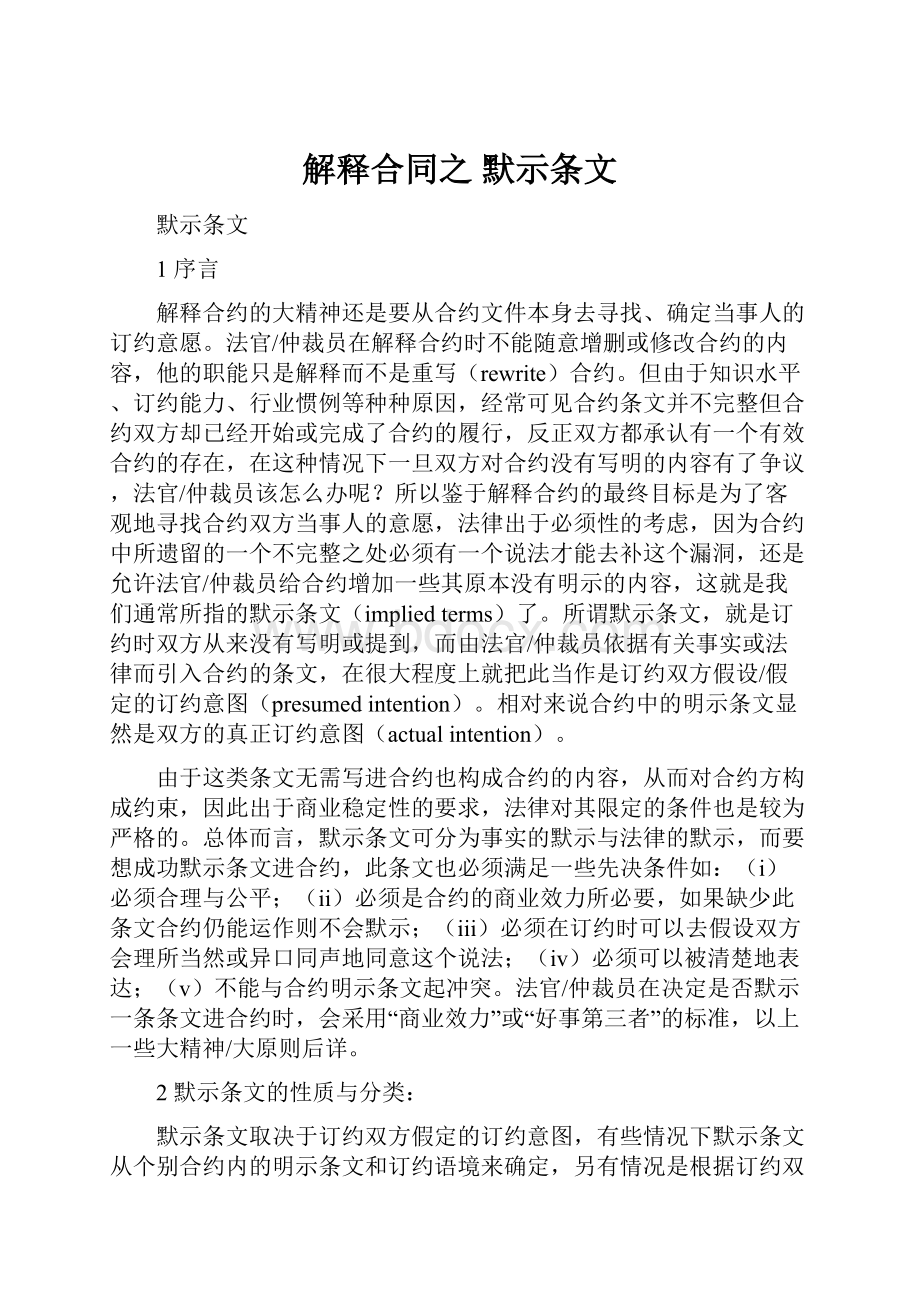解释合同之 默示条文.docx
《解释合同之 默示条文.docx》由会员分享,可在线阅读,更多相关《解释合同之 默示条文.docx(74页珍藏版)》请在冰豆网上搜索。

解释合同之默示条文
默示条文
1序言
解释合约的大精神还是要从合约文件本身去寻找、确定当事人的订约意愿。
法官/仲裁员在解释合约时不能随意增删或修改合约的内容,他的职能只是解释而不是重写(rewrite)合约。
但由于知识水平、订约能力、行业惯例等种种原因,经常可见合约条文并不完整但合约双方却已经开始或完成了合约的履行,反正双方都承认有一个有效合约的存在,在这种情况下一旦双方对合约没有写明的内容有了争议,法官/仲裁员该怎么办呢?
所以鉴于解释合约的最终目标是为了客观地寻找合约双方当事人的意愿,法律出于必须性的考虑,因为合约中所遗留的一个不完整之处必须有一个说法才能去补这个漏洞,还是允许法官/仲裁员给合约增加一些其原本没有明示的内容,这就是我们通常所指的默示条文(impliedterms)了。
所谓默示条文,就是订约时双方从来没有写明或提到,而由法官/仲裁员依据有关事实或法律而引入合约的条文,在很大程度上就把此当作是订约双方假设/假定的订约意图(presumedintention)。
相对来说合约中的明示条文显然是双方的真正订约意图(actualintention)。
由于这类条文无需写进合约也构成合约的内容,从而对合约方构成约束,因此出于商业稳定性的要求,法律对其限定的条件也是较为严格的。
总体而言,默示条文可分为事实的默示与法律的默示,而要想成功默示条文进合约,此条文也必须满足一些先决条件如:
(i)必须合理与公平;(ii)必须是合约的商业效力所必要,如果缺少此条文合约仍能运作则不会默示;(iii)必须在订约时可以去假设双方会理所当然或异口同声地同意这个说法;(iv)必须可以被清楚地表达;(v)不能与合约明示条文起冲突。
法官/仲裁员在决定是否默示一条条文进合约时,会采用“商业效力”或“好事第三者”的标准,以上一些大精神/大原则后详。
2默示条文的性质与分类:
默示条文取决于订约双方假定的订约意图,有些情况下默示条文从个别合约内的明示条文和订约语境来确定,另有情况是根据订约双方的法定关系本质来确定。
这两种情况表示了默示条文可分为两种,前一种是法律的默示(impliedbylaw),后一种是事实的默示(impliedinfact)。
Wright勋爵在Luxor(Eastbourne)Ltdv.Cooper(1941)A.C.108是这样说:
“Theexpression‘impliedterm’isusedindifferentsenses.Sometimesitdenotessometermwhichdoesnotdependontheactualintentionofthepartiesbutonaruleoflaw,suchastheterms,warrantiesorconditionswhich,ifnotaruleoflaw,suchastheterms,warrantiesorconditionswhich,ifnotexpresslyexcluded,thelawimports,asforinstanceundertheSaleofGoodsActandtheMarineInsuranceAct.Butacaselikethepresentisdifferentbecausewhatitissoughttoimplyisbasedonanintentionimputedtothepartiesfromtheiractualcircumstances.”。
在后期的案件,Wright勋爵的这个分类开始引人注意,Simonds子爵与Tucker勋爵在Listerv.RomfordIceandColdStorageCoLtd(1957)A.C.555也有提到。
但这个两分法真正发展起来是在LiverpoolCityCouncilv.Irwin(1977)A.C.239,在这个先例中,贵族院的Cross勋爵对这两种默示有区分如下:
“Whenitimpliesaterminacontractthecourtissometimeslayingdownageneralrulethatinallcontractsofacertaintype—saleofgoods,masterandservant,landlordandtenant,andsoon—someprovisionistobeimpliedunlessthepartieshaveexpresslyexcludeit.Indecidingwhetherornottolaydownsuchaprimafacierulethecourtwillnaturallyaskitselfwhetherinthegeneralrunofsuchcasestheterminquestionwouldbeonewhichitwouldbereasonabletoinsert.Sometimes,however,thereisnodefinedtypebutwhatthecourtisbeingineffectaskedtodoistorectifyaparticular—oftenaverydetailed—contractbyinsertinginitatermwhichthepartieshavenotexpressed.Hereitisnotenoughforthecourttosaythatthesuggestedtermisonethepresenceofwhichwouldmakethecontractabetterorfairerone;itmustbeabletosaythattheinsertionofthetermisnecessarytogive—asitisput—businessefficacytothecontractandthatifitsabsencehadbeenpointedoutatthetimebothparties—assumingthemtohavebeenreasonablemen—wouldhaveagreedwithouthesitationtoitsinsertion.”。
2.1默示类别之一:
法律的默示
这里可去举一些简单的例子让读者更好地理解这两种不同的默示条文。
首先是举法律的默示,这默示可来自商业习惯作法/惯例(请看本章第10段)、立法或普通法/案例法。
上述Wright勋爵的判词中就提到了两个立法,一是《货物销售法》(《SaleofGoodsAct》),另是《海上保险法》(《MarineInsuranceAct》)。
在1979年英国《货物销售法》,它内中有许多的默示条文,其中最重要的例子是卖方对出售的货物有一个默示条文,即他有权出售该有关货物,货物也没有债务与押记,及买方可宁静地占有该货物,等。
这是在第12条文,可去部分节录如下:
“12.Impliedtermsabouttitle,etc.
(1)Inacontractofsale,otherthanonetowhichsubsection(3)belowapplies,thereisanimplied(term)onthepartofthesellerthatinthecase4ofasalehehasarighttosellthegoods,andinthecaseofanagreementtosellhewillhavesucharightatthetimewhenthepropertyistopass.
(2)Inacontractofsale,otherthanonetowhichsubsection(3)belowapplies,thereisalsoanimplied(term)that–
(a)thegoodsarefree,andwillremainfreeuntilthetimewhenthepropertyistopass,fromanychargeorencumbrancenotdisclosedorknowntothebuyerbeforethecontractismade,and
(b)thebuyerwillenjoyquietpossessionofthegoodsexceptsofarasitmaybedisturbedbytheownerorotherpersonentitledtothebenefitofanychargeorencumbrancesodisclosedorknow…”。
另是针对将来的货物,《货物销售法》之第14条文有各种不同的针对。
一是默示有关货物是满意的质量(satisfactoryquality)。
这是第14
(2)条文,如下:
“14.Impliedtermsaboutqualityorfitness
…
(2)Wherethesellersellsgoodsinthecourseofabusiness,thereisanimpliedtermthatthegoodssuppliedunderthecontractareofsatisfactoryquality.
(2A)ForthepurposesofthisAct,goodsareofsatisfactoryqualityiftheymeetthestandardthatareasonablepersonwouldregardassatisfactory,takingaccountofanydescriptionofthegoods,theprice(ifrelevant)andalltheotherrelevantcircumstances.
(2B)ForthepurposesofthisAct,thequalityofgoodsincludestheirstateandconditionandthefollowing(amongothers)areinappropriatecasesaspectsofthequalityofgoods—
(a)fitnessforallthepurposesforwhichgoodsofthekindinquestionarecommonlysupplied,
(b)appearanceandfinish,
(c)freedomfromminordefects,
(d)safety,and
(e)durability.
(2C)Thetermimpliedbysubsection
(2)abovedoesnotextendtoanymattermakingthequalityofgoodsunsatisfactory—
(a)whichisspecificallydra2wntothebuyer’sattentionbeforethecontractismade,
(b)wherethebuyerexaminesthegoodsbeforethecontractismade,whichthatexaminationoughttoreveal,or
(c)inthecaseofcontractforsalebysample,whichwouldhavebeenapparentonareasonableexaminationofthesample.”。
笔者无意再多去介绍有关《货物销售法》,反而想去介绍这些立法的默示条文是如何操作。
举例说,在一个船舶买卖,买方在接受船舶的时候才发觉船舶以前留下了大量的债务,导致船舶在一些港口不断被扣押。
这一来,买方的损失显然应该可以向卖方索赔。
但要成功索赔首先在责任方面要证明卖方违反买卖合约的条文。
如果双方的买卖合约是以一些草拟得严谨的标准格式合约,例如1993年挪威格式,它是有一条明示条文去针对卖方不能遗留债务,这是第9条文如下:
“9.Encumbrances
ThesellerswarrantthattheVessel,atthetimeofdelivery,isfreefromallcharters,encumbrances,mortgagesandmaritimeliensoranyotherdebtswhatsoever.ThesellersherebyundertaketoindemnifytheBuyersagainstallconsequencesofclaimsmadeagainsttheVesselwhichhavebeenincurredpriortothetimeofdelivery.”。
在这个情况下,买方很容易就能证明卖方违反了买卖合约的第9条明示条文,接下去只是去计算赔偿损失的金额。
但不难想到有一些订约没有这么正规的情况,例如是游艇或内河船舶的买卖,买卖双方根本不知道也不会去使用挪威格式。
这一来,订约双方没有去想到也自然去漏掉如上述的挪威格式第9条文可能性就很大了,这正是Steyn勋爵在近期的EquitableLifeAssuranceSocietyv.Hyman(2002)1A.C.408,CA,HL所说的“generaldefault”的情况。
这一来,难道无辜的买方买下了一艘留有许多债务的船舶难道就没有救济了吗?
显然,这并不公道。
加上,这种情况会是很普遍,因为《货物销售法》适用在所有种类货物的买卖包括船舶。
所以,为了公平、公共政策或法治的需要,有了这一个立法去强加这些默示条文。
这一来,买方向卖方索赔损失,如果卖方扯皮说:
“我从来没有对你作出任何承诺说该船舶没有债务。
”,买方就可以回答说:
“就算是没有明示条文去作出这种承诺,但《货物销售法》有默示条文要求该船舶没有债务与可以让我作为买方享有宁静的占有,但你做不到,所以违反了默示条文。
”。
当然,即使是立法的默示条文,如果不是像1924年《海牙规则》这样规定不能以明示条文改变的话,也不影响双方的订约自由。
所以默示条文是应该屈服于明示条文,例如上述船舶的卖方以明示条文说明该船舶有一笔债务,而买方也接受了,这一来《货物销售法》的有关默示条文就在此方面不适用了。
Wright勋爵提到的另一个立法就是1906年《海上保险法》,这里面也是有大量的默示条文。
最为人所知的是第17条文说明保险合约是要“绝对善意”(utmostgoodfaith),再多举一个例子是立法的第39条文针对航次保险,受保人的船东有一个在航次开始前使船舶必须绝对/严格适航的默示保证。
这些默示条文的操作如上述例子,笔者不去多介绍。
至于以保险合约明示条文去否定或更改立法的默示条文,针对“绝对善意”就很少会出现,但针对航次保险对必须适航的默示保证,就比较多见到有明示条文去作出改变以减轻或避免对船东的绝对适航责任。
例如在货物保险,由于这种保险也是受1906年《海上保险法》的管辖,就有一条标准条文可简称为“SeaworthinessAdmittedClause”去放弃这一个默示责任,因为今天的货方根本管不了船舶是否适航。
例如在1982年的“学会货物条文(A)”(InstituteCargoClauses[A]),就有第5.2条文说:
“Theunderwriterswaiveanybreachoftheimpliedwarrantiesofseaworthinessoftheshipandfitnesspftheshiptocarrythesubject-matterinsuredtodestination,unlesstheAssuredortheirservantsareprivytosuchunseaworthinessorunfitness.”。
除了立法外,普通法也会去增加默示条文。
例如Mahmudv.BankofCreditandCommerceInternationalSA(1998)AC20,HL,贵族院在雇佣合约确认了有一个默示条文就是双方有一个相互信任的关系(trustofconfidence)。
例如雇主不应做一些不诚实与腐败的事情,而这些事情会导致雇员的前途受损。
在Listerv.RomfordIceandColdStorageCoLtd(1957)A.C.555,案情也是涉及一份雇佣合约中,争议是是否在雇主疏忽情况下雇主要负责赔偿其雇员。
Simonds子爵说这不是个别合约的问题,他说:
“withageneralquestion,whichifnotcorrectlydescribedasaquestionofstatus,yetcanonlybeansweredbyconsideringtherelationinwhichthedriversofmotor-vehiclesandtheiremployersgenerallystandtoeachother.…IfIweretotrytoapplythefamiliartestswherethequestioniswhetheratermshouldbeimpliedinaparticularcontractinordertogiveitwhatiscalledbusinessefficacy,Ishouldlosemyselfintheattempttoformulateitwiththenecessaryprecision.Butthisisnotconclusive,forasIhavesaid,thesolutionoftheproblemdoesnotrestontheimplicationofaterminaparticularcontractbutuponmoregeneralconsiderations.”。
读者可以注意到上述举的例子是普遍性地默示在每一不同类别的合约,而不是个别情况。
法律默示也不理会每一个案件不同的事实,唯一只屈服于明示条文,因为大原则还是订约自由。
这种默示也不追究订约双方的真正或假设订约意图,甚至是默示最重要的一个要求是它是否必要(necessary)才可让有关的合约有商业效力(businessefficacy)并可以运行(workable)也会较宽松,因为有一些法律的默示是出于更广泛的考虑,例如是公共政策与整体的合理性。
唯一能去否定这种法律默示条文就是以清楚无误的明示条文去加以否定,换言之订约自由与双方的订约意愿仍是至高无上的大原则。
这里可去节录《ChittyonContracts》一书第29版第一册13-003段如下:
“Termsimpliedbylaw.Theimplicationofatermisamatteroflawforthecourt,andwhetherornotatermisimpliedisusuallysaidtodependupontheintentionofthepartiesascollectedfromthewordsoftheagreementandthesurroundingcircumstances.Inmanyclassesofcontract,however,impliedtermshavebecomestandardized,anditissomewhatartificialtoattributesuchtermstotheunexpressedintentionoftheparties.Thecourtis,infact,layingdownageneralruleoflawthatinallcontractsofadefinedtype—forexample,saleofgoods,landlordandtenant,employment,thecarriageofgoodsbylandorsea—certaintermswillbeimplied,unlesstheimplicationofsuchatermwouldbecontrarytotheexpresswordsoftheagreement.Suchimplicationsdonotdependontheintentionsoftheparties,actualorpresumed,butonmoregeneralconsiderations.”。
另可节录Diplock勋爵在PhotoProductionsLtdv.SecuricorTransportLtd(1980)A.C.827,HL中强调了“法律默示”对商业合约的重要性,他说:
“Abasicprincipleofthecommonlawofcontract,towhichtherearenoexceptionsthatarerelevantintheinstantcase,isthatpartiestoacontractarefreetodetermineforthemselveswhatprimaryobligationstheywillaccept.Theymaystatetheseinexpresswordsinthecontractitselfand,wheretheydo,thestatementisdeterminative;butin